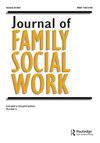Parent-child interaction therapy: Tailoring treatment to meet the sociocultural needs of an adoptive foster child and family
IF 0.7
Q3 SOCIAL WORK
引用次数: 3
Abstract
ABSTRACT Mental health service providers (e.g., social workers, psychologists) working with children in the child welfare system are uniquely poised to evaluate and tailor treatments for maximum effectiveness for these populations. Interventions that focus on improving the parent-child relationship and decreasing behavior problems, such as Parent-Child Interaction Therapy (PCIT), are important in assisting adoptive foster families as they transition to new family additions. However, sociocultural considerations in the administration of PCIT with adoptive foster families have not been well explored. The current study uses a clinical case design to illustrate the successful implementation and tailoring of PCIT with a multi-racial family who adopted a 4-year old boy with behavior problems. PCIT contributed to a clinically significant decrease in parent-reported behavior problems and an increase in parental use of effective behavior management strategies. Three considerations common among adoptive foster families (family adjustment, unequal parent attachment, and trauma-related background) contributed to the need for socio-culturally oriented treatment tailoring. Parental engagement was maintained throughout treatment. Our findings highlight the importance of culturally responsible treatment delivery. Future recommendations for mental health providers working with adoptive foster children and families are discussed.亲子互动治疗:定制治疗,以满足社会文化的需要,收养寄养儿童和家庭
摘要:在儿童福利系统中从事儿童工作的心理健康服务提供者(如社会工作者、心理学家)具有独特的能力来评估和定制治疗方法,以最大限度地提高这些人群的治疗效果。专注于改善亲子关系和减少行为问题的干预措施,如亲子互动治疗(PCIT),对于帮助收养寄养家庭过渡到新的家庭成员非常重要。然而,在对收养寄养家庭进行PCIT管理时,社会文化因素尚未得到很好的探讨。本研究采用临床案例设计来说明PCIT在一个多种族家庭中的成功实施和定制,该家庭收养了一名有行为问题的4岁男孩。PCIT有助于临床上显著减少父母报告的行为问题,并增加父母对有效行为管理策略的使用。收养-寄养家庭中常见的三个考虑因素(家庭适应、父母不平等依恋和创伤相关背景)有助于调整社会文化导向的治疗。在整个治疗过程中保持父母的参与。我们的研究结果强调了提供文化上负责任的治疗的重要性。讨论了为收养寄养儿童和家庭工作的心理健康提供者提出的未来建议。
本文章由计算机程序翻译,如有差异,请以英文原文为准。
求助全文
约1分钟内获得全文
求助全文
来源期刊

Journal of Family Social Work
SOCIAL WORK-
CiteScore
2.10
自引率
0.00%
发文量
4
期刊介绍:
Each issue of the Journal of Family Social Work contains peer reviewed research articles, conceptual and practice articles, creative works, letters to the editor, and book reviews devoted to innovative family theory and practice subjects. In celebrating social workers" tradition of working with couples and families in their life context, the Journal of Family Social Work features articles which advance the capacity of practitioners to integrate research, theory building, and practice wisdom into their services to families. It is a journal of policy, clinical practice, and research directed to the needs of social workers working with couples and families.
 求助内容:
求助内容: 应助结果提醒方式:
应助结果提醒方式:


